Chef Chris Hill, who opened his first restaurant at 28, talks about the things he wishes he knew before becoming a chef and shares his advice in his new blog, The Things I Wish I Knew Before Becoming a Chef.
I don’t think we really choose the life of a chef. I think it’s a magnetic pull of sorts, at least for those destined for greatness in the kitchen. It finds us, bringing us home to a place we never knew existed.
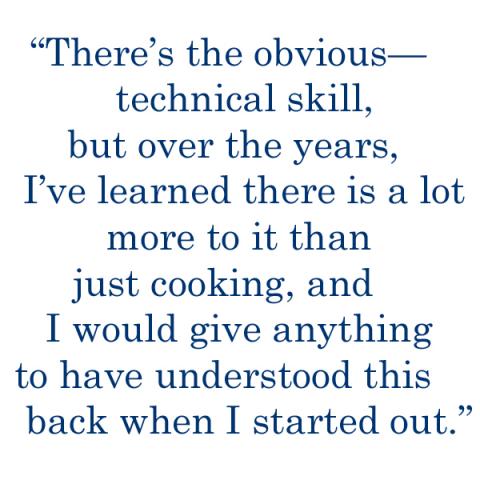 The kitchen is where our blood flows fastest and where minutes turn into seconds, and for a few hours we are lost in the zone. A waist high sandwich unit in front of us with our mise en place, a bunch of burners behind us and a stack of a dozen sauté pans are nearby, waiting to serve their purpose. The convection oven hums, the fryer simmers, and depending on the time of day, it’s either mind-numbingly quiet, or frantically loud.
The kitchen is where our blood flows fastest and where minutes turn into seconds, and for a few hours we are lost in the zone. A waist high sandwich unit in front of us with our mise en place, a bunch of burners behind us and a stack of a dozen sauté pans are nearby, waiting to serve their purpose. The convection oven hums, the fryer simmers, and depending on the time of day, it’s either mind-numbingly quiet, or frantically loud.
Most of us do our best work when we have to — under pressure. We call out tickets spewing from the printer for 4 or 5 or 6 hours, working through them as a team. These nights can be long, and they make our bodies feel a couple decades older than they actually are. Thankfully, adrenaline is there to carry us through to the finish line for a shift drink. Perhaps we limp there, and we are unquestionably exhausted, but as things wind down, it’s time stop thinking about food for a brief moment. It’s time to acknowledge each other, our teammates. We powered through another busy shift, and we did it together.
“Good push kitchen.”
I’ve had a lot of these days and nights, and often think about the things of which a really good cook or chef is made. There’s the obvious — technical skill, but over the years, I’ve learned there is a lot more to it than just cooking, and I would give anything to have understood this back when I started out.
The rest? Well, here ya go….
We find that first job on the line, or head to culinary school, which gets us moving down this path — it’s our foot in the door, but it’s only the beginning. Now it’s time to execute and prove our worth. The kitchen is now a classroom and it’s up to you to learn from the guys higher up in the food chain and through the experiences you encounter on a daily basis. Show up every day with the goal of learning something new — a new knife cut, a more efficient mise en place, or hell, figure out a better way to tie your apron. Anything. Over the course of a year, which is then multiplied over a career, that is a hell of a lot of new techniques, hacks or ways of looking at things. But, it takes being intentional about it, and I can promise you, this is something I wish someone had instilled in me when I first decided to become a chef. It leads to growth. Visible growth, which leads a higher place in the pecking order, and in turn more cash heading your way come pay day.
SHOW UP EVERY DAY TO LEARN SOMETHING
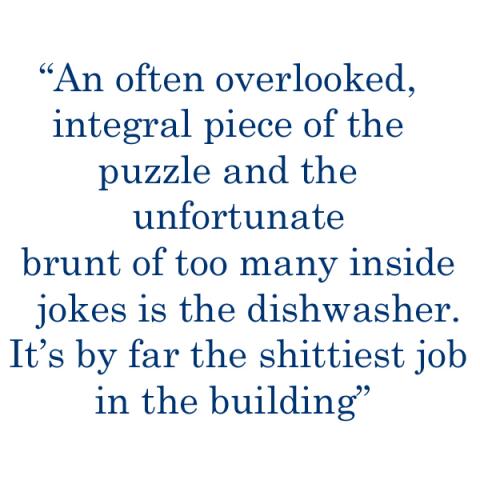 Soon you’ll be getting pretty good, hopefully soaking up the experience and talent around you. Somewhere along the way, if you are good enough, you’ll someone will hand you the keys, and people will start calling you Chef. I think we all now know that being a chef is something that’s earned through hard work, built on respect and has nothing to do with a diploma, nor the amount of time you’ve spent working over a stove. With that title comes responsibility, and it starts with your team , the people around you, who, let’s face it will be seeing a lot more of you than your spouse or anyone else. Treat them with respect. This includes inexperienced waiters who mis-ring tickets at the worst possible times and those bartenders who don’t know what the hell a compote is. Just remember, they are doing their best, just like you.
Soon you’ll be getting pretty good, hopefully soaking up the experience and talent around you. Somewhere along the way, if you are good enough, you’ll someone will hand you the keys, and people will start calling you Chef. I think we all now know that being a chef is something that’s earned through hard work, built on respect and has nothing to do with a diploma, nor the amount of time you’ve spent working over a stove. With that title comes responsibility, and it starts with your team , the people around you, who, let’s face it will be seeing a lot more of you than your spouse or anyone else. Treat them with respect. This includes inexperienced waiters who mis-ring tickets at the worst possible times and those bartenders who don’t know what the hell a compote is. Just remember, they are doing their best, just like you.
An often overlooked, integral piece of the puzzle and the unfortunate brunt of too many inside jokes is the dishwasher. It’s by far the shittiest job in the building, and they are often doing it for minimum wage, making less than everyone else. I always express my appreciation verbally, and make it a point to make his meal every day. He’s always grateful, always wants something simple, and as a result, it makes him feel that much more like I care that he’s there and a part of the team. Plus, the rest of the staff sees this, and now a tone of respect and courtesy has been set. This is how company culture is built.
Your staff can be your greatest asset, or your worst liability, and you, as the leader determine which side of the equation they fall into.
Every kitchen has a weak link, and if you aren’t sure who that is in yours, maybe it’s you. As their boss, it’s important to take these folks under your wing and guide them. Some people just need a bit of direction. We’ve all been there before, somewhere in life, and it’s on us, as leaders, to provide them with every opportunity to succeed. Communicate what you expect from them, as detailed as needed. Do that — if they aren’t catching on and it’s still not working out, you can then make the proper decision with a clean conscious, knowing you treated them with the same respect that you’d appreciate and expect in such a situation. Adapt this mentality and you’ll save a ton of money in the long run. Lower staff turnover results in fewer training hours, less wasted pay roll, and a more experienced group of guys and gals working together. To me, there is nothing more gratifying than being in complete sync with my fellow workers, and staff turnover inhibits this process immensely.
Teamwork is everything, and it is built on communication, trust and respect.
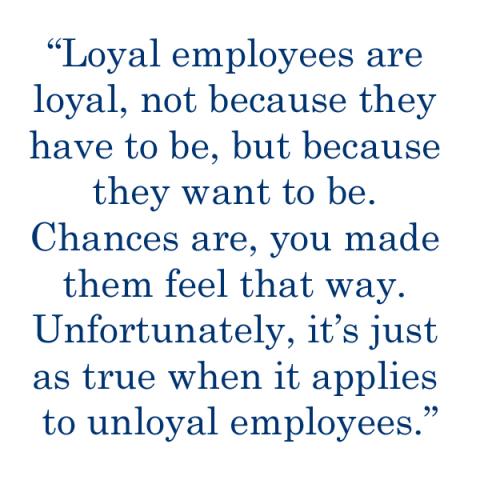 Managing a team is challenging, stressful. With that said, please, please, please, don’t be a yeller. Sure, it happens, but don’t make a habit out of it. Assholes in the kitchen aren’t cool anymore, and neither are power trips. Hell, the kitchen is stressful enough as is, who really needs more of it? The more controlled the environment and staff are, the greater your chances are for success. At the same time, don’t put up with a jackass who is that guy, the one who’s above everyone else, and treating people like shit. Parasites are some of the worst things that can happen to a kitchen, or a company in general, and they suck the life right out of you and don’t mind bringing the rest down with them. This is one type of behavior that absolutely can’t be tolerated, and that’s not coming from an HR perspective, that’s coming from a more real, human level. When you take control of this situation, and the staff sees you stand up for them, or a situation, they’ll respect you that much more for it.
Managing a team is challenging, stressful. With that said, please, please, please, don’t be a yeller. Sure, it happens, but don’t make a habit out of it. Assholes in the kitchen aren’t cool anymore, and neither are power trips. Hell, the kitchen is stressful enough as is, who really needs more of it? The more controlled the environment and staff are, the greater your chances are for success. At the same time, don’t put up with a jackass who is that guy, the one who’s above everyone else, and treating people like shit. Parasites are some of the worst things that can happen to a kitchen, or a company in general, and they suck the life right out of you and don’t mind bringing the rest down with them. This is one type of behavior that absolutely can’t be tolerated, and that’s not coming from an HR perspective, that’s coming from a more real, human level. When you take control of this situation, and the staff sees you stand up for them, or a situation, they’ll respect you that much more for it.
Loyal employees are loyal, not because they have to be, but because they want to be. Chances are, you made them feel that way. Unfortunately, it’s just as true when it applies to unloyal employees.
There is also that one kitchen worker who just isn’t bringing enough to the table. Half the time they can’t recall the ingredients making up various dishes, and you can tell, if you look hard enough, that their heart isn’t really in it. They typically do minimal prep, and always have an excuse for why they can’t cover a sick coworker’s shift. The same guy, when the situation is reversed, bitches about how he works with a bunch of assholes, because no one will cover for him.
Show me the guy or gal willing to go out of his way for you and your company, and I’ll show you someone worth keeping around. To achieve this, though, you’ve got to give them more than just a job — give them something to buy into.
With everything, from menu, to on-the-clock behavior, it’s up to you to establish a scale of what’s acceptable, and communicate that, so that all are on the same page. Now, you, the chef, are ultimately responsible and accountable when food goes out wrong, or when that cook flirts just a little too much with the cleavage-baring hot new bartender. Own it, fix it, learn from it, and move on.
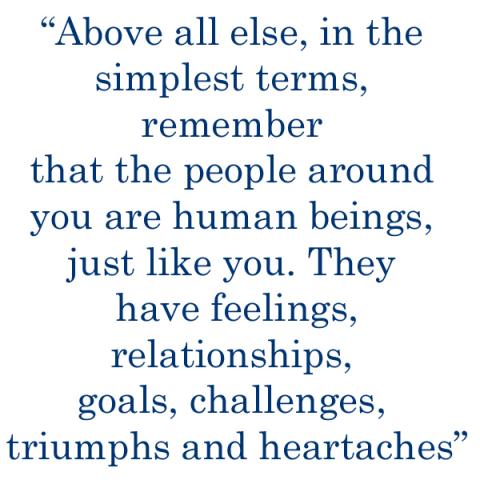 “Mediocrity breeds mediocrity, while excellence breeds excellence. If you want to be excellent, commit to that, and hold yourself accountable every single day. How can you possibly hold anyone else accountable, when you can’t even, first, do the same for yourself?“
“Mediocrity breeds mediocrity, while excellence breeds excellence. If you want to be excellent, commit to that, and hold yourself accountable every single day. How can you possibly hold anyone else accountable, when you can’t even, first, do the same for yourself?“
We aren’t all meant to be executive chefs and restaurant owners. Many are perfectly content working in the industry in order to make enough money to merely support a family. Others, need a part time job working through college, or can only work a few nights a week for whatever reason. And, some want the experience of working in your type of restaurant, or maybe even for you specifically, so they can put it on their resume and leverage that experience for something down the road. There is nothing wrong with any of these scenarios, but it’s important to have a conversation early on, so we know what to expect. A mutual understanding. When it’s all out on the table, there’s no surprises, no getting blindsided, and allows us to support them on the way out the door as they move on to something new.
When hiring it’s important to meet people where they are, and to know where they are heading. Otherwise we might be heading in two different directions from the outset and not even know it.
Above all else, in the simplest terms, remember that the people around you are human beings, just like you. They have feelings, relationships, goals, challenges, triumphs and heartaches — all things that make life exciting, but at the same time challenging, and often stressful. Cars break down, hell, happened to my sous this morning and it caused him to miss the rush, and we needed him today. People get sick, family members die, and more common, though less dramatic, is the strain that an intense work environment can have on us, both physically and mentally.
The more you realize this and live accordingly, your staff will notice that you’re not just looking out for yourself, but this takes connecting with those very same innate parts of ourselves, realizing that we are all in this together. So, if that’s the case, we might as well build meaningful relationships along the way, learn something from the craft, as well as each other, make some delicious food, and once it’s time to retire, you’ll be able to look around and smile at what you’ve built, and the impact you’ve created by being intentional with who you are. By being a chef.
All cooking aside, that’s what I think it truly means to be a chef.
 Chef Chris Hill left a job in the business world to follow his heart and passion into the world of cooking and the kitchen. Chris opened his first restaurant at 28 and grew into the role of executive chef.
Chef Chris Hill left a job in the business world to follow his heart and passion into the world of cooking and the kitchen. Chris opened his first restaurant at 28 and grew into the role of executive chef.
Having taken his experiences in the corporate world, as well as those in the kitchen, Chris has built a large social media following centered around TV appearances all over the Southeast U.S., his writing, TEDx talks, and his mission of helping industry workers to lead fulfilling, successful careers.
Chris' first book comes out in the Summer of 2016 and is a dive into what makes for a successful career in the restaurant world, and includes exclusive interviews with some of the world's leading and most respected chefs.
You can follow Chris on Facebook, Twitter and Instagram, and read more of his work here.
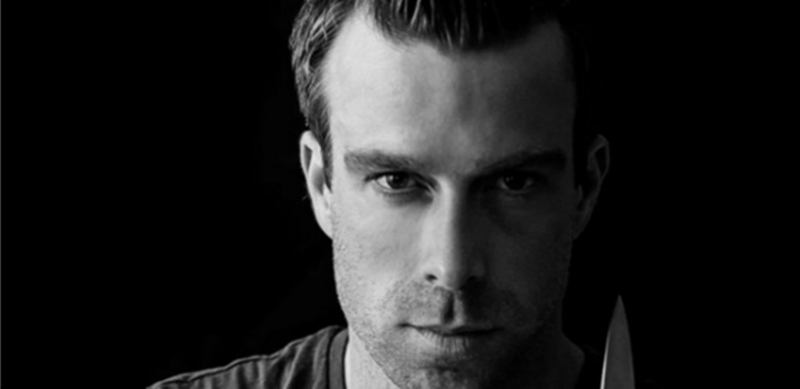

 The kitchen is where our blood flows fastest and where minutes turn into seconds, and for a few hours we are lost in the zone. A waist high sandwich unit in front of us with our mise en place, a bunch of burners behind us and a stack of a dozen sauté pans are nearby, waiting to serve their purpose. The convection oven hums, the fryer simmers, and depending on the time of day, it’s either mind-numbingly quiet, or frantically loud.
The kitchen is where our blood flows fastest and where minutes turn into seconds, and for a few hours we are lost in the zone. A waist high sandwich unit in front of us with our mise en place, a bunch of burners behind us and a stack of a dozen sauté pans are nearby, waiting to serve their purpose. The convection oven hums, the fryer simmers, and depending on the time of day, it’s either mind-numbingly quiet, or frantically loud. Soon you’ll be getting pretty good, hopefully soaking up the experience and talent around you. Somewhere along the way, if you are good enough, you’ll someone will hand you the keys, and people will start calling you Chef. I think we all now know that being a chef is something that’s earned through hard work, built on respect and has nothing to do with a diploma, nor the amount of time you’ve spent working over a stove. With that title comes responsibility, and it starts with your team , the people around you, who, let’s face it will be seeing a lot more of you than your spouse or anyone else. Treat them with respect. This includes inexperienced waiters who mis-ring tickets at the worst possible times and those bartenders who don’t know what the hell a compote is. Just remember, they are doing their best, just like you.
Soon you’ll be getting pretty good, hopefully soaking up the experience and talent around you. Somewhere along the way, if you are good enough, you’ll someone will hand you the keys, and people will start calling you Chef. I think we all now know that being a chef is something that’s earned through hard work, built on respect and has nothing to do with a diploma, nor the amount of time you’ve spent working over a stove. With that title comes responsibility, and it starts with your team , the people around you, who, let’s face it will be seeing a lot more of you than your spouse or anyone else. Treat them with respect. This includes inexperienced waiters who mis-ring tickets at the worst possible times and those bartenders who don’t know what the hell a compote is. Just remember, they are doing their best, just like you. Managing a team is challenging, stressful. With that said, please, please, please, don’t be a yeller. Sure, it happens, but don’t make a habit out of it. Assholes in the kitchen aren’t cool anymore, and neither are power trips. Hell, the kitchen is stressful enough as is, who really needs more of it? The more controlled the environment and staff are, the greater your chances are for success. At the same time, don’t put up with a jackass who is that guy, the one who’s above everyone else, and treating people like shit. Parasites are some of the worst things that can happen to a kitchen, or a company in general, and they suck the life right out of you and don’t mind bringing the rest down with them. This is one type of behavior that absolutely can’t be tolerated, and that’s not coming from an HR perspective, that’s coming from a more real, human level. When you take control of this situation, and the staff sees you stand up for them, or a situation, they’ll respect you that much more for it.
Managing a team is challenging, stressful. With that said, please, please, please, don’t be a yeller. Sure, it happens, but don’t make a habit out of it. Assholes in the kitchen aren’t cool anymore, and neither are power trips. Hell, the kitchen is stressful enough as is, who really needs more of it? The more controlled the environment and staff are, the greater your chances are for success. At the same time, don’t put up with a jackass who is that guy, the one who’s above everyone else, and treating people like shit. Parasites are some of the worst things that can happen to a kitchen, or a company in general, and they suck the life right out of you and don’t mind bringing the rest down with them. This is one type of behavior that absolutely can’t be tolerated, and that’s not coming from an HR perspective, that’s coming from a more real, human level. When you take control of this situation, and the staff sees you stand up for them, or a situation, they’ll respect you that much more for it. “Mediocrity breeds mediocrity, while excellence breeds excellence. If you want to be excellent, commit to that, and hold yourself accountable every single day. How can you possibly hold anyone else accountable, when you can’t even, first, do the same for yourself?“
“Mediocrity breeds mediocrity, while excellence breeds excellence. If you want to be excellent, commit to that, and hold yourself accountable every single day. How can you possibly hold anyone else accountable, when you can’t even, first, do the same for yourself?“ Chef Chris Hill left a job in the business world to follow his heart and passion into the world of cooking and the kitchen. Chris opened his first restaurant at 28 and grew into the role of executive chef.
Chef Chris Hill left a job in the business world to follow his heart and passion into the world of cooking and the kitchen. Chris opened his first restaurant at 28 and grew into the role of executive chef.









